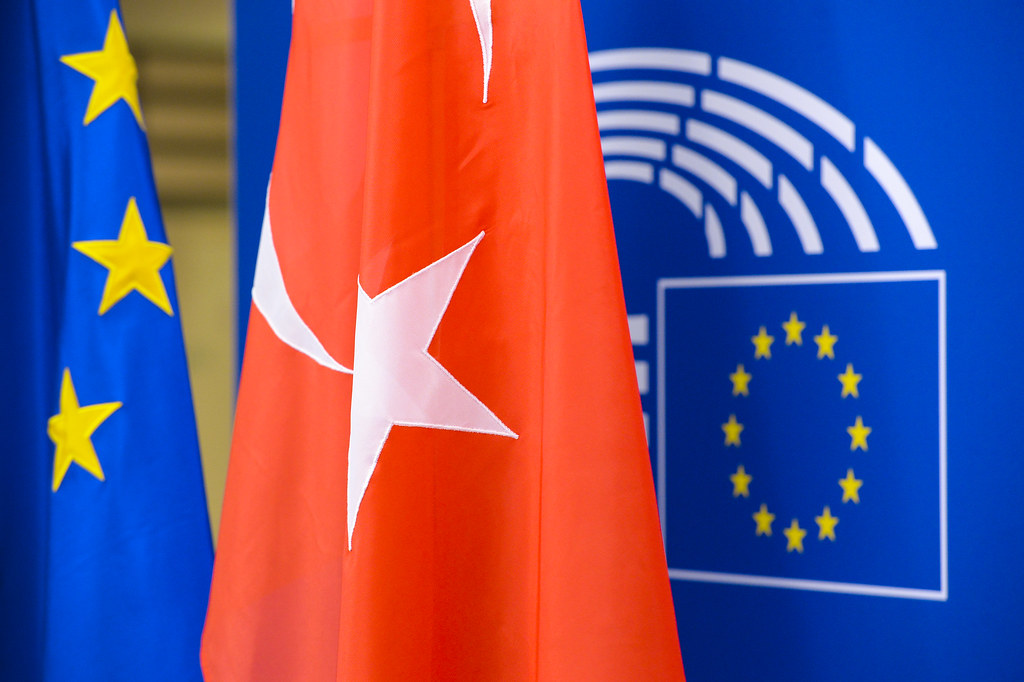The EU Council’s controversial EU-Turkey agreement of 17-18 March to tackle the refugee crisis has two major objectives: to stop/or substantially reduce the massive inflow of irregular migrants arriving to the Greek islands from Turkey (thus dismantling the smuggling networks) and to design an ordered resettlement mechanism in the EU for Syrians currently in Turkey. These objectives will be tackled with two separate but interdependent measures. First, all irregular migrants arriving in Greece from 20 March onwards will be returned to Turkey beginning on 4 April. Secondly, starting at the same time as these returns, for every Syrian returned the EU and its members will allow a Syrian refugee to legally enter the EU, the so called ‘1-for-1’ mechanism.
“[The EU-Turkey agreement] is a far cry from Angela Merkel’s open borders policy of the summer of 2015”
As explicitly stated in the EU-Turkey statement, these measures are ‘temporary and extraordinary’ (although it is not clear how ‘temporary’ they will be), justified –‘to end the human suffering and restore public order’– and can only take place ‘in full accordance with EU and international law, thus excluding any kind of collective expulsion. All migrants will be protected in accordance with the relevant international standards and in respect of the principle of non-refoulement’.
The deal is, then, about exceptional and temporary mechanisms to try to halt an emergency and a humanitarian crisis. It is also a far cry from Angela Merkel’s open borders policy of the summer of 2015, and somehow marks the EU’s political turning point on the refugee crisis than started with the dramatic appeal by President Tusk in Athens, ‘Do not come to Europe. Do not believe the smugglers. Do not risk your lives and your money. It is all for nothing’, while trying to reach a consensus between the Member states and the Turkish at the Leaders meeting of 7 March.
The announcement came shortly after the European Council of February demanded a stop to the ‘wave-through approach’ and the approval of the joint statement by nine Western Balkan Countries, on an Austrian initiative, that, de facto, closed the Western Balkan route and left Greece as a ‘warehouse of souls’ (in Prime Minister Alexis Tsipras’ emotive expression): as of 31 March, more than 50,000 migrants were stranded in Greece, most of them along the border with Macedonia. The ‘closing’ of the Aegean Sea route by virtue of the EU-Turkey agreement is also implicitly reiterating the measures taken along the Western Balkans route and may lead to the emergence of alternative routes via the Black Sea or Albania, as well as to the renewed use of existing routes, namely from Libya into Italy.
However, even if the agreement’s legality can be saved at face value, its ultimate success is most uncertain and much depends on fulfilling Herculean implementation tasks (in the words of President Juncker) on extremely short deadlines while many political, ethical, logistic, legal and practical questions remain unanswered.
At present, never has the devil been so much in the detail. Athens transferred persons that were staying in the islands and are not covered by the agreement (who arrived before the 20 March) to the mainland in order to ‘distinguish’ between the two groups. They form part of the 51,000 people remaining in Greece who, according to EU law, will either have to be sent back to their countries of origin, if they are illegal migrants, or have their asylum claims examined. However, there is no known plan about how the Greek authorities are going to deal with them. Meanwhile, several NGOs and the UNHCR suspended some of their activities in the Greek islands in protest, while hotspots started to be adapted from ‘registration and screening’ to ‘implementing returns to Turkey’, which includes increasing detention capacity in the facilities.
Particularly important will be the practical implementation of the controversial return of ‘all irregular migrants’, in due respect for EU law. It is almost certain that decisions of inadmissibility on the basis of Turkey being a ‘safe third country’ as defined in the Asylum Procedures Directive (APD) will be referred by Greek courts to the Court of Justice. Complaints to the European Court of Human Rights are not off the horizon either.
“The Turks, in exchange […], obtained the (re)opening of the negotiating chapters for EU accession, speeding up visa liberalisation by four months”
The objective of proceeding to accelerate smooth returns is obviously challenged by procedural safeguards such as the right to an individual process examination, the access to effective remedy and the corresponding right to remain in Greece until the expiration of the time limit for an appeal or pending a decision. It will also be interesting to see how the Greek courts interpret the possibilities of using the fast-track procedures foreseen in the APD.
The Turks, in exchange for accepting the readmission of irregular migrants from Greece, obtained the (re-)opening of the negotiating chapters for EU accession (albeit in a much less ambitious form than originally requested), speeding up visa liberalisation by four months, to be concluded by the end of June, and additional financial support. Any delays in granting visa-free travel to Turkey due to the growing reluctance in certain Member States and in the European Parliament would, most certainly, have a negative impact on the agreement’s implementation. The Commission is struggling between sticking to the strict fulfilment of the benchmarks listed in the visa liberalisation roadmap and the political pressure to accelerate the process. The credibility of the whole visa liberalisation mechanism is at stake. Other countries on the EU’s periphery (Ukraine, Morocco and Cape Verde) are watching events closely.
The positive aspect is that the fulfilment of those benchmarks would help Turkey to enhance its asylum system, which in addition to certain measures already taken as to the Syrians’ legal protection, could eventually help to dispel some well-founded doubts on Turkey’s capacity to fulfil its part of the returning mechanism and protect resettled migrants in accordance with international standards.
“We are demanding that Greece deal simultaneously with thousands of persons remaining on its territory and implement and manage the ‘new’ hotspots with their renewed capacities”
Legal questions aside, it must be recalled that the point of departure is a very deficient Greek asylum system, as proved by the Strasbourg Court’s ban on other countries sending asylum seekers back to Greece since 2011. Even with considerable amounts of financial support via EU Humanitarian Aid and Civil Protection (ECHO), we are demanding that Greece deal simultaneously with thousands of persons remaining on its territory and implement and manage the ‘new’ hotspots with their renewed capacities to send people back to Turkey. Additionally, with a poor record of Member States reacting to EU calls, the foreseen support of providing Greece with up to 4,000 experts, as estimated by the Commission, does not look promising. Indeed, they are arriving slowly according to the Commission’s implementation fact sheet. In a tired country, strangled by austerity policies and with poor organisational traditions it can be really too much to ask, even if we are talking about the land of Hercules.
Against such a background and with a voluntary-based agreement, the only chance for it to work lies in the Member States’ willingness and solidarity. The same applies to the resettlements under the ‘1:1’ scheme.
The measure is not as legally complex as the returning mechanism but requires an even sounder logistical framework and a stronger commitment and solidarity from the Member States to offer up to a limit of 72,000 Syrian resettlement pledges. Again, we must also not forget that the legal and infrastructure asylum capacities still vary widely among Member States. Some countries simply have not developed national asylum capacities and the Commission recently issued infringement proceedings against nine Member States, including Germany and France, for the non-transposition of several directives of the Common European Asylum System. Even before the Brussels terrorist attacks, some countries were very reluctant to take part in the decisions to relocate 160,000 people in the first place. Linking refugees to investigations of terrorist attacks and invoking the need for security checks, as Poland did, undermines the already insignificant resettlement implementation rate.
The future of the mechanism is linked to the number of returns. If returns hit the 72,000 threshold or the levels of irregular migration halt, the EU will move to a voluntary humanitarian admission scheme. If it rises beyond that number, this would mean that Turkey is most likely not complying with its part of the deal on border controls and the agreement will be ‘discontinued’.
It is too soon to ascertain the effects of the measure on migrant inflows, but prospects are not optimistic as persons continue to arrive daily in Greece. Not to mention the priority given in the agreement to relocate Syrians that, in practice, means that we are forgetting others in need of protection, such as Afghans and Iraqis. Therefore, even if numbers decline, it is likely that non-Syrians in particular will seek alternative routes.
Thus, the question is: are these the right herculean tasks to overcome such Olympic challenges? Or are we misinterpreting the signs once more and not understanding that structural, non-transitory challenges cannot be overcome with exceptional, transitory actions, however difficult they may be to implement?



